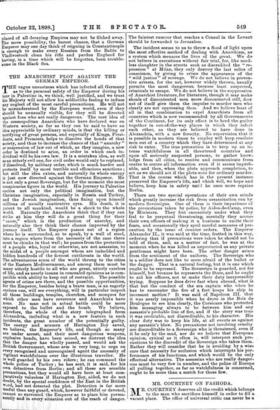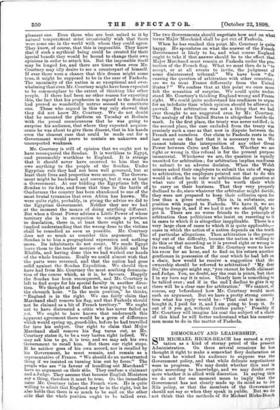MR. COURTNEY ON FASHODA.
MR. COURTNEY deserves all the credit which belongs to the man who sacrifices himself in order to fill a. • vacant place. The office of universal critic can never be a -pleasant one. Even those who are best _suited to it by natural temperatirent mist 'occa.sionally wish that 'there -were some one in the world with whom they could agree. They know, of course, that this is impossible. They know that if such a mythical being could be created for their special benefit they would be bound. to change their own opinions in order to attack his. But the impossible itself may be longed for, and there are times when even Mr. Courtney may idly desire to see a counterpart of himself. If ever there were a chance that this dream might come -true, it might be supposed to be in the case of Fashoda. The unanimity of the nation is so exceptional and over- whelming that even Mr. Courtney might have been expected -to be commonplace to the extent of thinking like other people. If there had been no. other reason for expecting this, the fact that his prophecies in regard to the Soudan had. proved so wonderfully untrue seemed to constitute one. Those who -argued in this way only showed that -they did not know Mr. Courtney. We do not doubt -that he mounted the platform on Tuesday at Bodmin -with the proud consciousness that he was going to surprise his audience, that where they expected acquies- cence he was about to give them dissent, that in his hands -even the clearest case that could be made out for a 'Government would prove to contain an unknown and -unsuspected weakness.
Mr. Courtney is still of opinion that we ought not to have reconquered the Soudan. It is worthless to Egypt, and presumably worthless to England. It is strange that it should never have occurred to him that we -owe anything to the people of the Soudan. Under Egyptian rule they had not been well governed, but at least their lives and properties were secure. The Govern- ment might be backward and corrupt, but it was at least a Government. At our bidding the Egyptians left the Soudan to its fate, and from that time to the battle of aDuadurman the country has been abandoned to one of the afloat brutal tyrannies that even Africa has known. We -were quite right, probably, in giving the advice we did to -the Egyptian Government. Neither they nor we had at the moment the means of doing anything different. But when a Great Power advises a Little Power of whose -territory she is in occupation to consign a province to desolation, there is, at least there ought to be, an implied understanding that the wrong done to the victims shall be remedied as soon as possible. Mr. Courtney -does not so much as consider this argument. The Soudan is to him a geographical expression and nothing more. Its inhabitants do not count. We made Egypt leave them to the tender mercies of the Mahdi and the ahalifa, and having done this we had washed our hands of the whole business. Really we could almost wish that the parts were reversed, and that the nation had gone solid against the Soudan Expedition. We should then have had from Mr. Courtney the most scathing denuncia- tion of the course which, as it is, he favours. Happily -the Soudan has been reconquered., and Mr. Courtney is left to find scope for his special faculty in another direc- tion. We thought at first that he was going to fail us at the eleventh hour. "In the main position," he thinks, England is in the right. We can fairly claim that Marchand shall remove his flag, and that Fashoda should not be claimed as a bit of French territory." We ought not to have distrusted a critic who has never failed us' yet. We ought to have known that underneath this apparent agreement there would be a germ of difference which would spring up, gourd-like, before he had travelled far into his subject. Our right to claim that Major Marchand shall remove his flag turns out, as Mr. Courtney states it, to be a very barren right indeed. We may ask him to go, it is true, and we may ask his own (Government to recall him. But there our right stops. If he neither goes of his own accord, nor is recalled by his Government, he must remain, and remain as a representative of France. "We should do an unwarranted thing if we insisted on turning him out by force." The people who are "in favour of bundling out Marchand." have no argument on their side. They confuse a claimant and a Judge. They assume that because English Ministers fay a thing, therefore it must be true. On the immediate issue Mr. Courtney takes the French view. He is quite -willing to admit that England may be in the right, but he also holds that there is so much to be said on the other side that the whole position ought to be talked over. The two Governments should negotiate how- on what terms Major Ma:rcliana shall be got out of ashoda. When he has reaC,hed this point Mr. Courtney is quite happy. He speculates on what the answer of the French Government is likely to be, and what course England ought tq take if that, answer should be to the effect that, Major Marchand must remain at Fashoda under the pro- tection of the French flag. What we must then do is "t4 accept, or at all events to invite, the judgment of some disinterested tribunal." We have been " cussing the question of arbitration with other countries ; are we to treat France differently from the United States ? " We confess that at this point we once more felt the sensation of surprise. We could quite under- stand Mr. Courtney's thinking England wrong and France right. We could quite understand his readiness to argue an indefinite time which opinion should be allowed to prevail. But arbitration was not a thing that we had ever thought to see suggested even by Mr. Courtney. The analogy of the United States is altogether beside the mark. In the first place, the treaty was never ratified; in the second place, the case excluded from the treaty was precisely such a case as that now in dispute between the French and ourselves. Our claim to Fashoda rests in the last resort on the fact that it is necessary to us. We cannot tolerate the interposition of any other Great Power between Cairo and the Lakes. Whether we are right or wrong in this refusal is for the present purpose immaterial. Whichever we are, the question is equally unsuited for arbitration ; for arbitration implies readiness to submit to an adverse decision.' When ' the Welsh miners asked their employers to submit the rate of wages to arbitration, the employers pointed out that to do this would in effect be to refer to arbitration the' question at what rate of profit it would be 'worth their while to carry on their business. That they very properly declined to do, since whatever 'the arbitrator -might decide, they were not prepared to keep their collieriea open for less than -a given return. This is, in substance, our position with regard to Fashoda. We have it, we are going to keep it, and if we had it not we should fight to get it. There are no worse friends to the principle of arbitration than politicians who insist on resorting to it in cases to which it is altogether inapplicable. There is a very large class of cases to which it is quite applicable,— cases in which the action of a nation depends on the truth of particular allegations. Then arbitration is the proper way out of the difficulty, because the nation is willing to do this or that according as it is proved right or wrong in its reading of the facts. If Mr. Courtney were to leave his room for an hour, and to find on his return another gentleman in possession of the' coat which he had left on a chair, how would he receive a suggestion that the ownership should be- referred to arbitration? MY dear Sir,' the straneer might Say, 'you cannot be both claimant and Sedge. You, no doubt, say the coat is yours, but then I in my turn say it is mine. Clearly here is something to be talked over ; and if in the end I edine to give it up there will be a, clear case for arbitration.' We cannot of course, say beforehand how Mr. Ochirtney' would meet such an argument. - But we have a pretty strong convic- tion what his reply would be': That coat is mine. I bought it, I paid for it, and I am going to keep it. - So out of it you get, without further parley.' ' Polasibly if MCCourtney will imagine his coat the subject ofa claim of this kind he will better understand what his country- men mean to do in the matter of Fashoda.











































 Previous page
Previous page